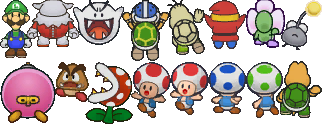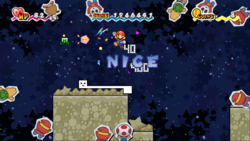Audience: Difference between revisions
mNo edit summary |
m (Text replacement - "(\[\[Category:[^\]\|\n]+) Characters(\]|\|)" to "$1 characters$2") |
||
| Line 68: | Line 68: | ||
{{SPM}} | {{SPM}} | ||
[[Category:Allies]] | [[Category:Allies]] | ||
[[Category:Paper Mario | [[Category:Paper Mario characters]] | ||
[[Category:Paper Mario: The Thousand-Year Door | [[Category:Paper Mario: The Thousand-Year Door characters]] | ||
[[Category:Super Paper Mario | [[Category:Super Paper Mario characters]] | ||
[[de:Publikum]] | [[de:Publikum]] | ||
[[it:Pubblico]] | [[it:Pubblico]] | ||
Revision as of 09:38, August 31, 2021

The audience (or crowd) are minor characters that appear in every battle sequence in Paper Mario: The Thousand-Year Door, in Super Paper Mario when the player performs a stylish move, and all battles in Paper Mario: The Origami King.
In Paper Mario: The Thousand-Year Door, every battle is performed on a stage in front of the audience. They can either be allies or enemies during the battles. The audience appears in the bottom of the screen, giving Mario SP when he attacks enemies, except when they are made up of Dull Bones. SP is used to refill Mario's Star Power which he needs to use Crystal Star moves.
However, audience members are not only useful for restoring Star Power. Some will interact with the combatants or other members. Additionally, bosses such as Hooktail may use the members as a power source, restoring HP upon eating the members. Magnus von Grapple 2.0 will even suck up members of the audience and launch them at Mario and his partners as an attack.
The audience may also throw objects at Mario. It can either be an item that will assist him or injure him. The items that will aid Mario can range from one coin to items such as the Boo's Sheet. Even powerful items such as Jammin' Jellies can be received, albeit rarely. In any case, if an item is thrown onstage and his inventory is full, the item will simply fall on the stage and disappear. The items that will hurt him range from rocks to crushed soda cans, never doing more than a few points of damage. In either case, a warning will flash before an audience member is about to throw something at Mario. The player has a few seconds to press ![]() to attack the offending member and have them temporarily flee the theater. Alternatively, the player can choose to do nothing to receive the item. The warning does not differentiate between good and bad items, so it is possible to attack an audience member offering a helpful item. When this happens, not only will this member flee, but several others will as well, but it is temporary. The player can also attack the audience member while the object has already been thrown. If the item is harmful, Mario can also switch places with his partner just before the item hits him, successfully dodging the item.
to attack the offending member and have them temporarily flee the theater. Alternatively, the player can choose to do nothing to receive the item. The warning does not differentiate between good and bad items, so it is possible to attack an audience member offering a helpful item. When this happens, not only will this member flee, but several others will as well, but it is temporary. The player can also attack the audience member while the object has already been thrown. If the item is harmful, Mario can also switch places with his partner just before the item hits him, successfully dodging the item.
The maximum capacity of the audience depends on Mario's level. The bigger the crowd, the more Star Power he and his party can restore each turn. Mario rises one rank every ten levels, beginning the game with the Rising Star level.
- Rising Star: 50
- B-List Star: 100
- A-List Star: 150
- Superstar: 200
Stages
All throughout the game, every battle takes place on a stage which will upgrade every 10 levels the player goes up, the first being the Rising Star stage, and the last being the Superstar stage. However, the stages are not purely cosmetic: they also greatly affect battles, with each stage introducing new mechanics, both positive and negative.
- On the Rising Star stage, the props onstage may become unstable either randomly or after a tremor (POW Block, Earth Quake, etc), dealing 1 damage to Mario and his partner if not guarded against, as well as the enemies, assuming they do not have defense. However, in some areas, the falling props may only deal damage to certain sides, such as in Boggly Woods, where the only prop large enough to cause damage is a tree on the enemies' side of the stage. In addition to this, random objects may also fall from the ceiling, doing 1 damage and likely inducing a status effect. If a bucket falls, the target will take 1 damage and is also likely to get the dizziness status. If a light falls, damage is dealt, but the target will also get the electric status effect. If a basin falls, it will do 1 damage and not cause any status effects. Similar objects may also fall into the audience, causing some of them to flee.
- On the B-List Star stage, special effects are introduced, however, the only effect that is unlocked on the B-List Star stage is ice. In the beginning of the battle, the special effects will spray into the air, doing nothing. However, they are very easily tipped over by nearly any action, and will face random directions. Should the special effects go off, they will cause the frozen status effect, immobilizing the target(s) unless guarded against or if the player has a status that protects them from attacks. Fog is also introduced, blanketing the entire stage and lowering the accuracy of both the player and the enemies. Fortunately, the fog can be cleared by Flurrie's Gale Force or an explosive attack, such as Bobbery's Bomb or an Egg Bomb/Coconut Bomb. However, the attack is still not guaranteed to succeed. Water may also rush down from the ceiling, affecting only one target and alleviating any negative status effects. Though the effect is only beneficial, it can be guarded against if the player wishes to do so.
- On the A-List Star stage, pyrotechnics are introduced, and randomly be selected as the battle's special effect, although the original special effect can still appear equally. More falling objects are added, such as one large grub insect doing 1 damage and possibly giving confusion if it is not guarded against, as well a torrent of smaller versions of said insect falling on the target that will do no damage but possibly cause confusion if not guarded against, and a giant fork that deals 2 damage and will remove any positive status effects if it is not guarded against.
- On the Superstar stage, fire is added as a special effect, doing damage and also causing the burn status if the player does not guard. An enormous statue of Bowser can fall, very likely causing dizziness or confusion if it not guarded, though unfortunately, it is difficult to do so. A large rock resembling the moon may roll across the stage, functioning the same way as the giant Bowser statue does.
Getting a Shine Sprite "Bingo!" will cause every seat in the audience to fill. Any other "Bingo!," with the exception of the Poison Mushroom, will fill half the capacity of the crowd. If three Poison Mushrooms are matched, however, every audience member will run away and Mario and his current partners' HP, FP, and SP will be cut in half. Players can always attract audience members again by doing well in the battle, and the next battle will always have a new crowd with other characters and usually the same species of characters.
In Super Paper Mario, an audience of sorts will appear whenever Mario or another playable character attacks an enemy and does a stylish move, which is done by shaking the Wii Remote when stomping on an enemy. They appear along the edges of the screen as paper cutouts. This approval of the audience gives the player a higher score than if they have just jumped on an enemy. The crowd in this game only has a handful of species from the previous game, taking out most of the species.
The audience plays a more active role in Paper Mario: The Origami King. As Mario rescues Toads folded up throughout the world, more of them will fill the stands in each battle. Mario can pay the audience up to 999 coins a turn for assistance. In regular battles, they can automatically solves puzzles, damage enemies, and provide items and healing. For boss battles, they can scatter items across the ring grid, show the path that Mario will take in the ring's current configuration, and provide items and healing. The more audience members that Mario has recruited and the more he pays them, the greater these effects will be. The Toads also make comments on the enemies Mario is currently facing or on the attack Mario is currently using.
Characters in the audience
Paper Mario: The Thousand Year Door
In this game, characters will not appear in the audience until the Chapter they are introduced in. For example, Punies will not appear until Chapter 2, Bulky Bob-ombs will not appear until Chapter 5 (with the exception of the Macho Grubba fight), and so on. The only exception is inside the Pit of 100 Trials, where all possible types of members can appear in the lower floors. Upon returning to previous areas, the battles there can still only have the types of audience members they originally had - for example, the lone Spiky Goomba in Rogueport Sewers can only ever have Toads, Goombas, Shy Guys, and/or Luigi in its battles' audiences.
* means they always help the player
** means they always harm the player.
*** means they can do both.
**** means they throw nothing.
- Boos *** (May turn a character in the battle Invisible for 1 turn.)
- Bulky Bob-ombs **** (May explode, causing many audience members to run away. Each one takes up two seats.)
- Crazee Dayzees ** (May sing, causing most of the audience to fall asleep, preventing them from providing Star Power.)
- Dull Bones ** (Provide Star Power only when using the Appeal command. They are the only audience members that throw bones.)
- Goombas **
- Hammer Bros. ** (The only audience members that throw hammers.)
- Koopa Troopas *** (Groups hide in their Shells, causing them to not give any Star Power.)
- Luigi ***[1] (Throws very rare items if satisfied.)
- Piranha Plants **** (May devour nearby audience members.)
- Punies * (All Punies in the audience will flee at once upon certain loud noises occurring.)
- Shy Guys *** (May jump onstage and trigger a random event.)
- Toads * (Give three times as much Star Power as other audience members.)
- X-Nauts ** (May team up with other X-Nauts in the audience to throw rocks at the front character, dealing a large amount of damage. If the first X-Naut is knocked out, the others will also put their rocks down.)
Super Paper Mario
Paper Mario: The Origami King
- Toads
- Shy Guys (during Shy Guys Finish Last)
Names in other languages
| Language | Name | Meaning | Notes |
|---|---|---|---|
| Japanese | 観客[?] Kankyaku |
Audience |
References
- ^ Luigi usually throws helpful items, but he does have a chance of throwing a rock as shown hereand here.
